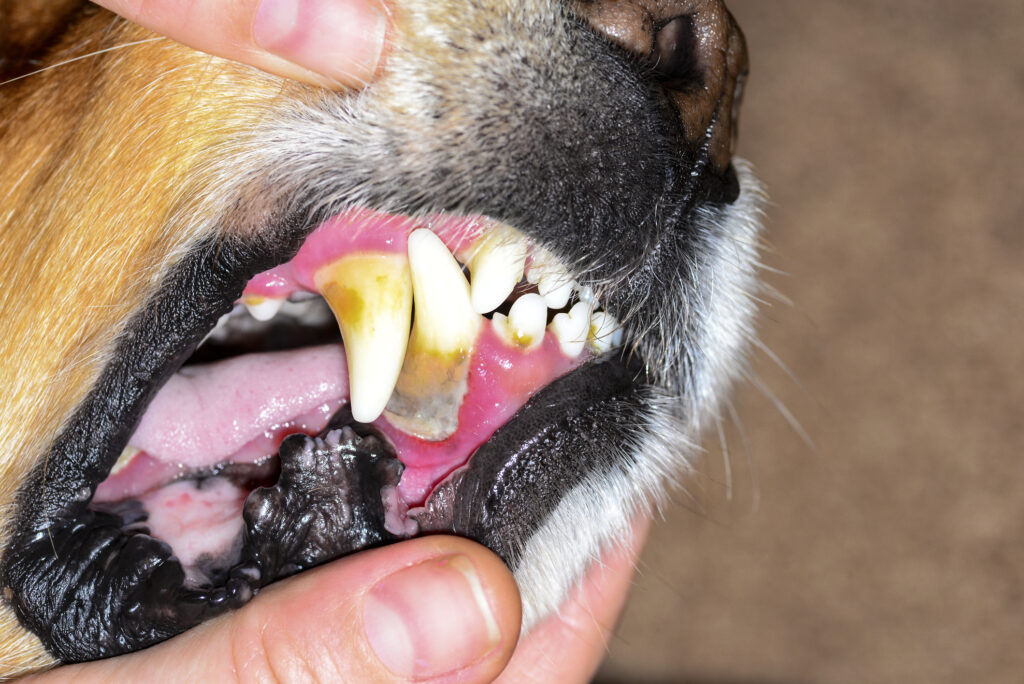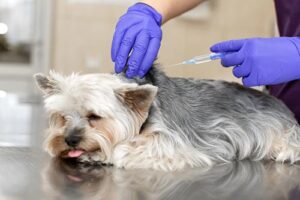Dog Periodontal Disease: Signs, Stages, and Treatment
Believe it or not, dog periodontal disease is much more common than you may think. Many dogs will develop periodontal disease at some point in their lives, especially as they age into their older years.
There are four stages of periodontal disease in dogs, with stage one being the least severe and stage four being the most severe. Symptoms of Periodontal disease in dogs range from bad smelling breath to dogs experiencing pain in the mouth.
In this article, we will be explaining everything that dog owners need to know about Periodontal disease in dogs. This will include describing the signs and stages of Periodontal disease in dogs as well as explaining how the condition is diagnosed and treated by a vet. We will be providing some helpful tips on how to prevent Periodontal disease in dogs as well. Let’s get into it.
What is Periodontal Disease?
Periodontal disease occurs when there is a buildup of bacteria in the mouth, specifically under the gums. As the disease progresses, this bacterial infection may erode the jaw and teeth in the mouth as well. Mammals can develop gum disease when their mouths are not kept clean. This includes pets like dogs and cats, as well as us humans.
Are There Different Stages of Periodontal Disease in Dogs?
There are four different stages of Periodontal disease in dogs. Stage 1 Periodontal disease is the least severe, and it has the best prognosis for recovery and the least severe symptoms associated with it. Meanwhile, stage 4 Periodontal disease is the worst type of gum disease possible in dogs. Here we will be describing and explaining a bit more about all the four stages of Periodontal disease in dogs.
Stage 1: Periodontal Disease
Stage 1 of Periodontal disease in dogs is essentially gingivitis. This stage is characterized by inflamed gums, but there has not been any damage done to teeth roots or the jawbone.
During this stage, you may notice that your dog’s gums are red and puffy. Your dog’s breath may also smell, and their teeth may bleed when getting their teeth brushed or chewing on hard objects. The prognosis is the best for dogs when they are diagnosed at stage 1 of Periodontal disease.
Stage 2: Periodontal Disease
Stage 2 Periodontal disease is a bit more severe than stage 1 Periodontal disease in dogs, and during this stage, a receding gum line may be present. Red and puffy gums and bad breath will be present as well. At stage 2 Periodontal disease, up to 25% of the jawbone and tooth roots may be damaged.
Stage 3: Periodontal Disease
At stage 3 Periodontal disease, up to 50% of the jawbone or tooth structures may be damaged. It is also possible for dogs with stage 3 Periodontal disease to be missing teeth. A receding gum line is usually present in dogs with stage 3 Periodontal disease.
Stage 4: Periodontal Disease
Stage 4 Periodontal disease is the most advanced form possible. Dogs with stage 4 Periodontal disease will likely be missing multiple teeth and/or have multiple teeth loose. The symptoms at this stage are also the most severe with pus and abscesses being present in the mouth and the roots of teeth being exposed. Dogs with stage 4 Periodontal disease will likely be experiencing a lot of pain as well.
What are the Signs of Periodontal Disease in Dogs?
There are many different signs of Periodontal Disease for dog owners to be aware of and watch out for. Here are some signs of stage 1 and stage 2 Periodontal disease in dogs.
- Red and puffy gums
- Bleeding gums during tooth brushings and when chewing on hard objects like bones
- Bad smelling breath
- Signs of a slightly receding gumline
- No longer allowing you to brush their teeth or touch their teeth
- Smacking their lips
- Start chewing and eating more gingerly
Stages 3 and 4 of Periodontal disease in dogs often include these symptoms as well. However, there will be other symptoms that are present as well. Some signs of advanced Periodontal disease in dogs include:
- Missing teeth or loose teeth
- Having roots of teeth exposed
- Signs of pain in the mouth (no longer eating dry food or chewing on chew toys)
- A sudden onset of aggressive or withdrawn behavior (indicative of pain)
- Pus present in and around the mouth
- Swelling around the mouth and face
If you notice any signs of Periodontal disease in your dog, it is a good idea to get them seen by a vet. This is even if you only suspect that they have an early stage of the disease. This way you can prevent the condition from progressing further.

How is Periodontal Disease in Dogs Diagnosed?
Periodontal disease in dogs is usually diagnosed by a vet after a physical exam and taking your dog’s medical history. The vet may take an X-Ray as well if they suspect damage to the jawbone or teeth roots.
How is Periodontal Disease in Dogs Treated?
Periodontal disease in dogs is treated differently depending on what stage they have. Stage 1 Periodontal disease is usually just treated with more frequent tooth brushing from the owner. The vet may recommend professional teeth cleanings as well. The good news is that stage 1 Periodontal disease is reversible.
Stage 2 Periodontal disease can be managed with more frequent teeth cleanings as well. Regular professional teeth cleanings from the vet are usually recommended as well. Unfortunately, stage 2-4 Periodontal disease cannot be reversed.
Stage 3 and 4 Periodontal disease is treated with professional teeth cleanings and tooth extraction when necessary.
How Can You Prevent Periodontal Disease in Dogs?
The best way that you can prevent Periodontal disease in dogs is to keep your dog’s teeth and mouth clean. The best way to do this is by brushing their teeth every day using a toothbrush and toothpaste that is made for dogs.
Another important step in preventing dog periodontal disease is making sure your dog is getting professional cleanings, yearly. If you are located near Manchester, NH, contact Best Friends Animal Hospital for professional dog teeth cleaning services. Our vets will investigate the root cause of this issue and help develop a plan to ensure your pet’s teeth are healthy. Give us a call today at (603) 625-2378.




